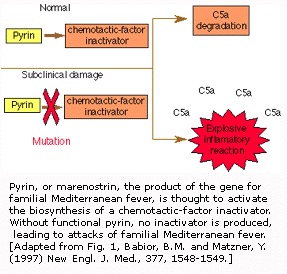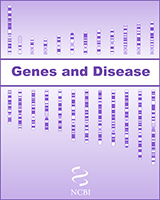NCBI Bookshelf. A service of the National Library of Medicine, National Institutes of Health.
National Center for Biotechnology Information (US). Genes and Disease [Internet]. Bethesda (MD): National Center for Biotechnology Information (US); 1998-.

Familial Mediterranean fever (FMF) occurs most commonly in people of non-Ashkenazi Jewish, Armenian, Arab, and Turkish background. As many as 1 in 200 people in these populations have the disease, with as many as 1 in 5 acting as a disease carrier. FMF is an inherited disorder usually characterized by recurrent episodes of fever and peritonitis (inflammation of the abdominal membrane).
In 1997, researchers identified the gene for FMF and found several different gene mutations that cause this inherited rheumatic disease. The gene, found on chromosome 16, codes for a protein that is found almost exclusively in granulocytes—white blood cells important in the immune response. The protein is likely to normally assist in keeping inflammation under control by deactivating the immune response—without this "brake," an inappropriate full-blown inflammatory reaction occurs: an attack of FMF.
Discovery of the gene mutations will allow the development of a simple diagnostic blood test for FMF. With identification of the mutant protein, it may be easier to recognize environmental triggers that lead to attacks and may lead to new treatments for not only FMF but also other inflammatory diseases.
Related diseases
- Genome view see gene locations
- Entrez Gene collection of gene-related information
- BLink related sequences in different organisms
- Research articles online full text
- Books online books section
- OMIM catalog of human genes and disorders
- GeneReviews a medical genetics resource
- Familial Mediterranean fever - Genes and DiseaseFamilial Mediterranean fever - Genes and Disease
Your browsing activity is empty.
Activity recording is turned off.
See more...
